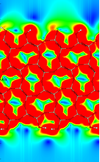Quantum Computation
Quantum computation, following the postulates of quantum mechanics, unlocks powerful capabilities in computing.
The smallest unit of information is a quantum bit or qubit. In contrast to the classic bit which may take the values 0 or 1, a qubit may also be in any superposition of 0 and 1 as long as it has not interacted with its environment. It may be thought as a spinning coin in a black box. The coin is simultaneously Heads and Tails, until we open the box after it has settled down and we observe it to be either Heads or Tails. The capabilities of computing that are offered by taking many of these spinning coins at the same time and interacting with them while they are spinning are vast.
The capabilities of quantum computation, such as quantum parallelism, tunnelling and quantum entanglement, do not exist in our every day world, verifying the non-intuitive nature of quantum computation. Quantum computation has already found various applications in quantum error correction, quantum cryptography and quantum search and combinatorial optimization problems. In 2011, the quantum computing company D-Wave Systems announced the creation of a task specific quantum processor, which employs an adiabatic quantum optimization algorithm, the quantum annealing algorithm, to find the index of a function that minimizes it.
For queries about this topic, contact Panagiotis Botsinis.
View the calendar of events relating to this topic.
Projects

Desiging Near-Capacity Quantum Error Correction Codes
Lajos Hanzo (Investigator), Zunaira Babar
Design efficient quantum error correction codes to correct the errors encountered in a quantum transmission; thus, increasing reliability and robustness of the future quantum systems.

Fidelity optimisation in an atomic quantum computer
Timothy Freegarde (Investigator), Jack Saywell
Development of optimised composite pulses for atomic quantum computers with the aim of reducing systematic errors in information processing caused by variations in laser intensity and environment.

Investigation into the Interfacial Physics of Field Effect Biosensors
Nicolas Green, Chris-Kriton Skylaris (Investigators), Benjamin Lowe
This interdisciplinary research aims to improve understanding of Field Effect Transistor Biosensors (Bio-FETs) and to work towards a multiscale model which can be used to better understand and predict device response.

Quantum Computation for Signal Detection in Multiple-Input Multiple-Output Communication Systems
Lajos Hanzo (Investigator), Panagiotis Botsinis
Optimal, classic optimization processes in communication systems, such as signal detection, introduce an extremely high computational complexity in the system. Quantum computation offers the optimal equivalent algorithms in the quantum domain, with at least a quadratic degradation in complexity. Since quantum computers have still not been physically realized though, the quantum algorithms' simulation's complexity is higher than that of the optimal classic equivalents. Use of Iridis is essential in facilitating their simulation.

Self Organized Network Routing using Quantum Evolutionary Methods
Lajos Hanzo (Investigator), Dimitrios Alanis
Self Organized Networks (SON) may consist of a large number of nodes, which could be fully interconnected. Optimizing its performance satisfying various Quality of Service (QoS) requirements is a quite complex procedure and the optimization problem belongs to the family of the Travelling Salesman Problems (TSP) which has been proven to be NP-hard as the number of nodes increases. In this project, various suboptimal methods are used in order to tackle this multi-objective optimization problem; in particular, the Ant Colony Optimization (ACO) and its quantum inspired counterpart (QACO) are being employed in order to reduce complexity.
People
 Lajos Hanzo
Lajos HanzoProfessor, Electronics and Computer Science (FPAS)
 Nicolas Green
Nicolas GreenReader, Electronics and Computer Science (FPAS)
 Timothy Freegarde
Timothy FreegardeSenior Lecturer, Physics & Astronomy (FPAS)
 Chris-Kriton Skylaris
Chris-Kriton SkylarisLecturer, Chemistry (FNES)
 Jia Huo
Jia HuoResearch Fellow, Chemistry (FNES)
 Panagiotis Botsinis
Panagiotis BotsinisPostgraduate Research Student, Electronics and Computer Science (FPAS)
 Evander DaCosta
Evander DaCostaPostgraduate Research Student, Electronics and Computer Science (FPAS)
 Benjamin Lowe
Benjamin LowePostgraduate Research Student, Electronics and Computer Science (FPAS)
 Juraj Mihalik
Juraj MihalikPostgraduate Research Student, Engineering Sciences (FEE)
 Maximillian Phipps
Maximillian PhippsPostgraduate Research Student, Chemistry (FNES)
 Jack Saywell
Jack SaywellPostgraduate Research Student, Engineering Sciences (FEE)
 Ashley Setter
Ashley SetterPostgraduate Research Student, Engineering Sciences (FEE)
 Valerio Vitale
Valerio VitalePostgraduate Research Student, Electronics and Computer Science (FPAS)
 George Winstone
George WinstonePostgraduate Research Student, Physics & Astronomy (FPAS)
 Jess Jones
Jess JonesTechnical Staff, iSolutions
 Dimitrios Alanis
Dimitrios AlanisNone, None
 Zunaira Babar
Zunaira BabarNone, None